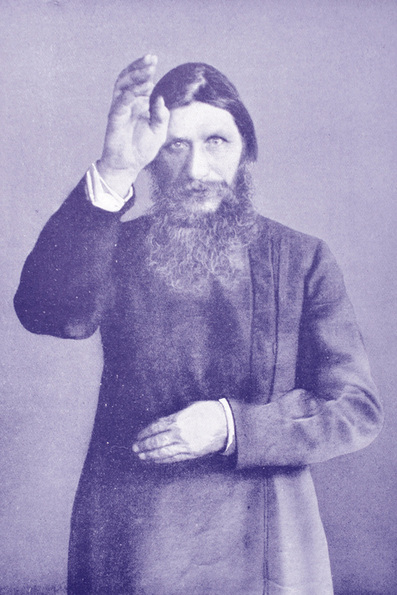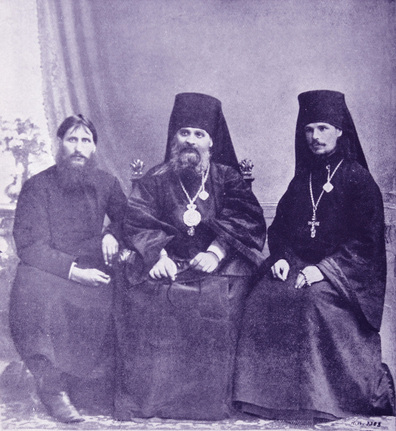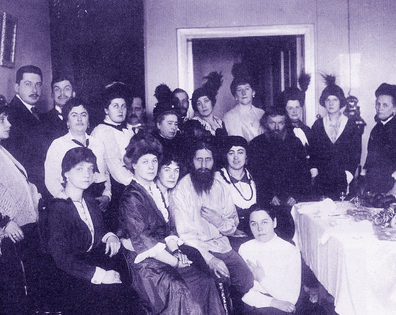Father Grigori Efimovitch Rasputin (1869-1916)'Love is Light and it has no end. Love is great suffering. It cannot eat. It cannot sleep. It is mixed with sin in equal parts. And yet it is better to love...If love is strong - the lovers happy. Nature Herself and the Lord give them happiness... All is in Love, and even a bullet cannot strike Love down.' - Father Gregory Rasputin (1869 -1916) Rasputin, always called simply “Father Grigori” by the immediate family, hailed from the village of Pokrovskoe in Siberia. There, he had early in his life established a reputation as a seer. But his was a farming background and by the time he came to go to the Imperial capital in 1907, he was already married with a family, whom he left behind when he journeyed to St.Petersburg. He always maintained that a vision of the Holy Virgin had directed him to go and help the heir to the throne.
St.Petersburg, in common with many other major cities at the end of the 19th century, was a place in which the rich and famous, much as today, were greatly interested in Spiritualism, Astrology and other forms of the occult. This in turn had grown from the mid-19th century Gothic revival and the stories of Mary Shelley, Bram Stoker and Victor Hugo. The salons of the Imperial circle abounded with such occultists. The most prestigious of these salons were those of the two Montenegran Grand Duchesses, Anastasia (Stana) and Militsa. This salon was attended by the Tsarina’s companion Anya Vyrubova. She would pass reports about those present to the Imperial Couple and, if there was anyone of great interest, the Tsar and Tsarina would attend in person. The first figure to make a great impression was a French seer and "soul doctor" by the name of Philippe Vachot, who was apparently a great wonderworker. In his turn, and in true John the Baptist fashion, he predicted the arrival of one greater than himself, a healer who would be of great service and who would speak to the Tsarina of God. . As if on cue, Rasputin duly appeared. His visions and healing ability were remarkable enough for him to have been unofficially accepted as a Father by the Russian Orthodox Church. Showing what he could do at the Grand Duchesses salon naturally led him to be soon introduced, by Anya Vyrubova, to the Imperial Family in person. The Tsarina’s view of the “Russian People” led her to see Rasputiin as the representative, to them of the ordinary people – in her mind the people who loved the Tsar, those whom they could trust. It was part of her view that encompassed her holy trinity – Autocracy, Orthodoxy – the People. Rasputin had an undeniably comforting presence when he was with the family. His knowledge of Nature and the rhythms of the Earth must have seemed wonderful to the children, for whom he opened worlds that had previously been closed to them, worlds previously only known to the Shamen of Siberia themselves, of whom Rasputin was one. This brings me to the other side of his nature. The side he didn’t show directly to the Imperial couple. His closeness to the Imperial family led to him being watched by the Tsar’s Secret Service, the Okhrana. They observed a man who drank heavily and had many women close to him. There were many aristocratic women who were his lovers at one time or another. But before we criticise him too much, we must remember the social conventions of the time and how harsh they were towards women. Most of the ladies he would have met would have been in loveless dynastic marriages, many of them denied by convention the very pleasures their husbands regularly gained with their mistresses. Rasputin offered the ladies, in his own terms, the “love of God”. A love given through him bodily to the women, by which they could achieve contact with a love which their marriages denied them. Further he would actively encourage a woman once thus liberated to go and seek such love herself. It is not hard to see why he wasn’t popular with many of the male aristocracy of the time. Rasputin’s actions were literally liberating the female half of the population and threatening the established social order. No wonder so many ladies went to his door. No wonder so many others, mostly men, wanted to discredit and get rid of him. Rasputin’s public behaviour, well documented by the Secret Service, was used by members of the wider Imperial Family in an attempt to discredit him and have him removed from the Imperial Family circle. However, because of the secrecy surrounding the condition of the Tsarievitch, these people would have been unaware of the fact that no matter what was said about him in public, the Tsar and Tsarina saw only the face Rasputin presented to them and his wider importance to them meant that these attempts to remove him were never going to work, much to the frustration of many outside the immediate family. Because even his most extreme behaviour didn’t see him removed from court, and because the truth was never admitted, speculation began to be rife about the “real” nature of his relations with the Tsar, Tsarina and especially the Imperial daughters. Rumours of a sexual relationship with the Tsarina abounded, as did rumours of similar relationships with the older girls. This was not helped by some of Rasputin’s sayings about the Imperial women in public when drunk, some of which could be taken in a sexual context. This was not helped by the widespread rumours of Rasputin’s involvement with a religious sect known as the Klysty. The religious ceremonies of this sect involved much whirling, like the Dervishes. Devotees would whip themselves and each other to heighten their physical ecstasy and the climax of the ceremony was a kind of group sexual experience, in which, it was believed the Christ Spirit could come down to Earth. One member of the Okrana, visiting Rasputin’s wife in Pokrovskoe broke the news to her of his sexual involvements with the aristocratic women of St.Petersburg, hoping to devastate her. Her response must have surprised him. Rasputin’s wife smiled at her would-be tormentor and said: “My husband has enough for everybody. Now get out.” Evidently Rasputin’s sexual exploits were far less of a problem for those at home in Siberia than they were for the scared upper-class males of St.Petersburg, worried that the fabric of their cosy social order was going to collapse if their women were liberated. All the gossip and newspaper reports had an effect. But that wasn’t Rasputin’s only problem. He was vehemently anti-war. He successfully persuaded the Tsar not to go to war over Constantinople in 1912, and his view was that war in Europe would only bring the shedding of too much innocent blood and ruin for Russia and the Tsar. When the Archduke Franz Ferdinand and his wife were assassinated in Sarajevo on June 28th 1914, Rasputin immediately foresaw what the consequences would be if the Tsar went to war. On his way to warn him on June 29th, he was knifed in the stomach in an assassination attempt by a prostitute, Khionia Guseva, thought to have been hired by Illiodor, a monk and religious rival. He was in hospital recovering for some time. British newspapers of the time reported his death in error. By the time he was finally free and could reach the Tsar it was too late. War had been declared. Over the next two years his behaviour became more erratic. He drank more heavily and when the Tsar, who took command of the war effort, against advice, in 1915, was away, it seemed to many at court that the Tsarina and her starets lover were the real rulers of the empire. Thinking to save the dynasty and prevent Russia pulling out of the war through Rasputin’s influence, a cousin of the Tsar, Grand Duke Dmitri, a playmate of the Imperial children since their childhood, Prince Felix Yusupov, and an agent of British Inteligence, Oswald Rayner, assassinated Rasputin on the night of December 30th 1916 (December 17th OS). Rayner later named his son Felix after the Prince, with whom he appears to have had a close friendship In a chilling final act of prophecy, Rasputin left a letter, saying that he knew he would soon die. If he was killed by the Russian people, then the Tsar would have nothing to fear. If however he was killed by members of the Tsar’s family, then neither the Tsar himself, nor any of his family would survive longer than 2 years after his death. Whichever way you look at this story, he was right. Neither this, nor Rasputin’s healings of the Tsarievitch have ever been adequately explained. |
Sergei Rachmaninov | NEXT PAGE |
All website content copyright © Steven Ingman-Greer. All rights reserved.



